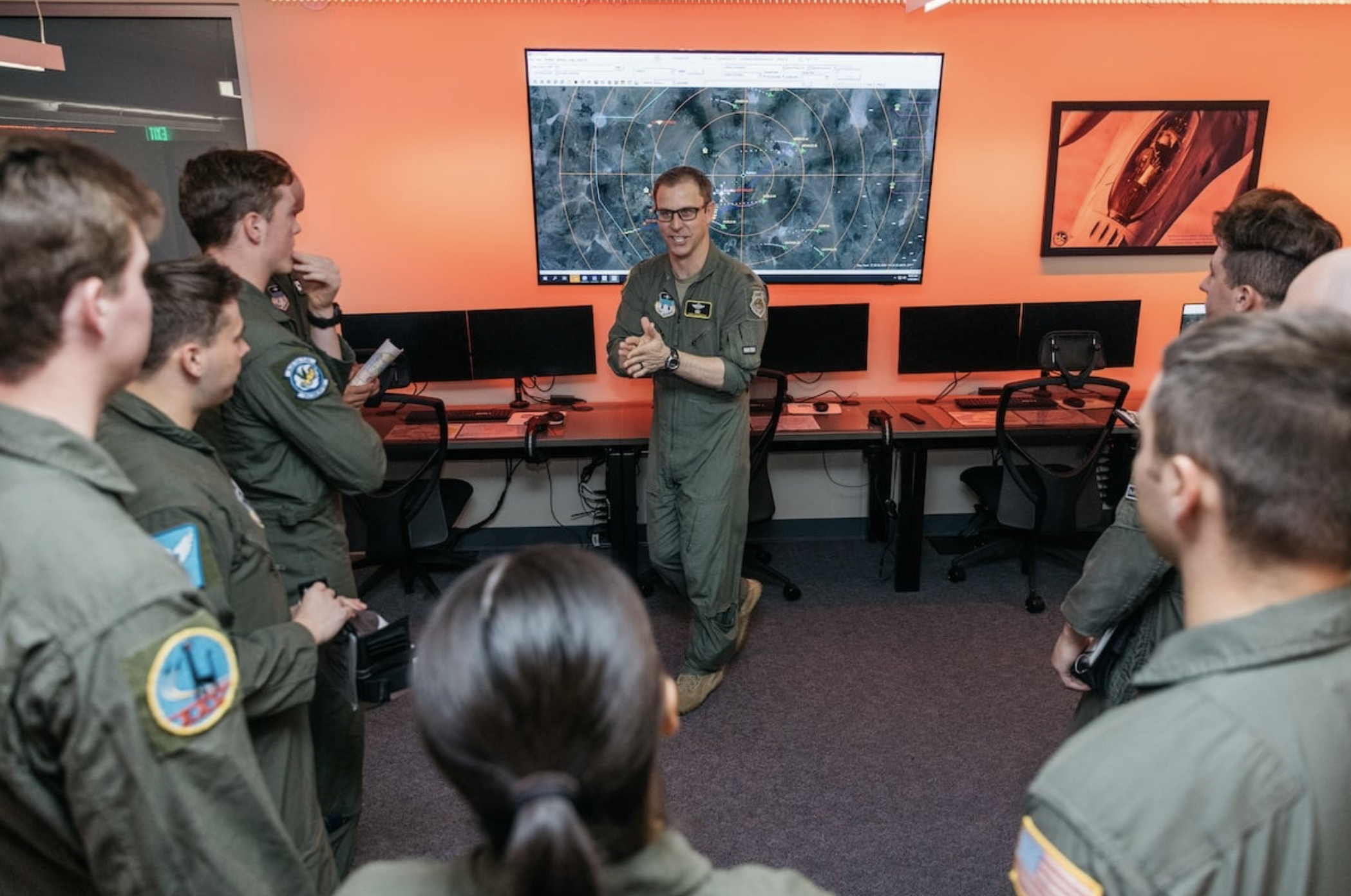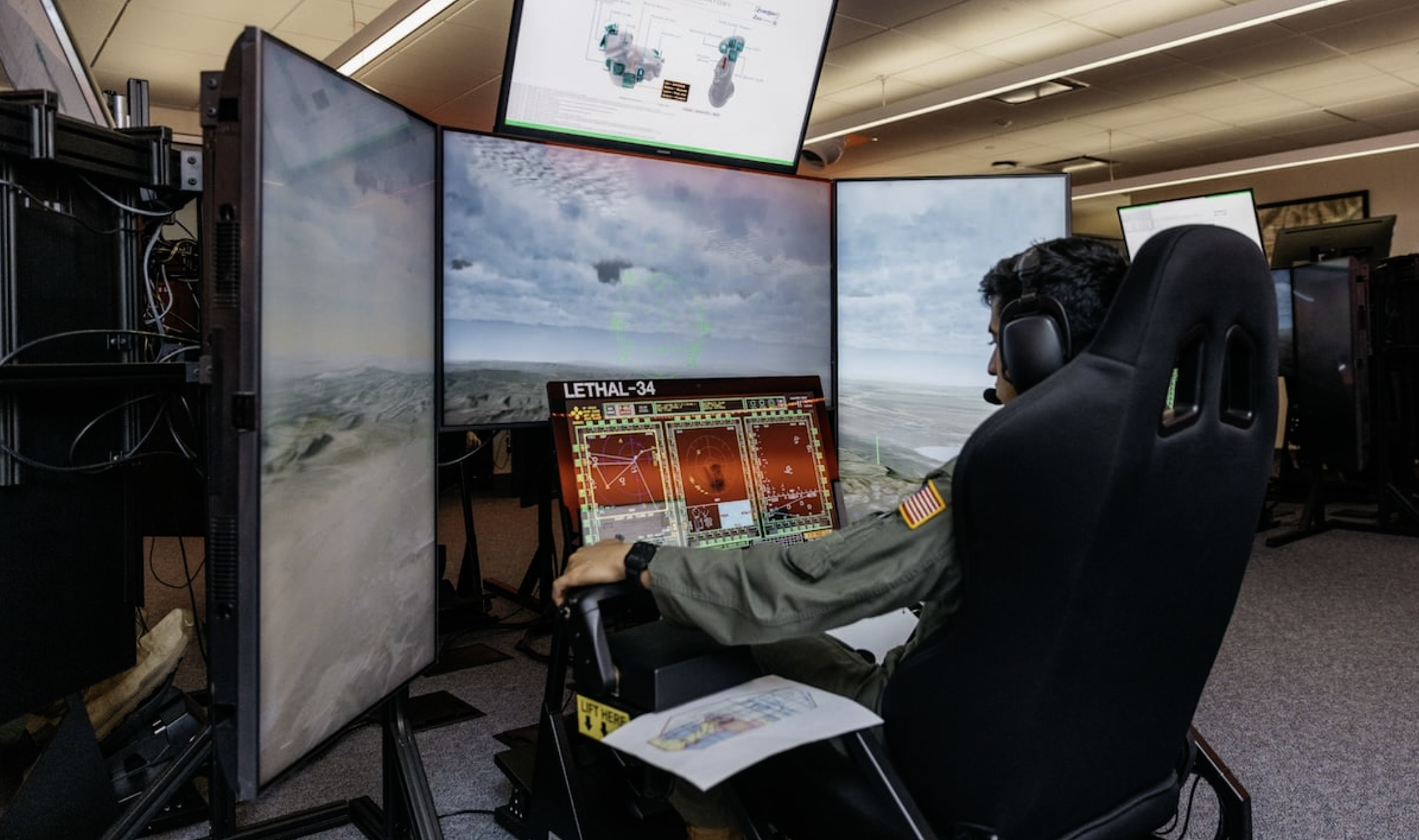News: IFC Influence Stretches Beyond Academy Boundaries
This story originally appeared in the June 2024 Checkpoints magazine. It is the third and final story in a series about the Institute for Future Conflict and its efforts to prepare USAFA cadets for the future fight. Checkpoints will continue to report on the IFC in upcoming issues.
To stay abreast of emerging global threats, fellows and senior leaders at the Air Force Academy’s Institute for Future Conflict aren’t merely observing from an academic ivory tower. They’re actively gathering intelligence from various sources and traveling abroad to research what’s truly happening in conflict hot spots.
A key touchpoint is the up to three weekly classified briefings from the Pentagon that IFC staff members, fellows and cadets with top-secret clearances attend remotely to find out the latest developments throughout the U.S. Department of Defense. Academy personnel are briefed inside the certified sensitive compartmented information facility on the fifth floor of McDermott Library.
“These DOD senior leaders are amazing,” says IFC Director Lt. Gen. (Ret.) Bradford “BJ” Shwedo ’87. “They share everything, and they’ll answer any question. That’s an opportunity I didn’t have as a cadet. It’s very insightful for these cadets, because they rapidly find out this is real, and this is where we’re going.”
One valuable example from early last year was a classified briefing by Gen. Kenneth Wilsbach — Air Combat Command commander and former Pacific Air Forces commander — to the entire Class of 2023. The IFC enabled the briefing in support of the Cadet Wing’s Firstie Flag exercise. The future-focused briefing on PACAF’s plans for competition and conflict in the Indo-Pacific was eye-opening for the soon-to-be second lieutenants, according to Gen. Shwedo.
“He told them they are going to be the captains of 2027, so they need to understand this stuff,” Gen. Shwedo recalls. “This is additional education and insight that I know would have excited me as a cadet.”
In 2022, Adm. John Aquilino — commander of U.S. Indo-Pacific Command — stated that the People’s Republic of China will be prepared to invade Taiwan by 2027. For cadets in the Class of 2023, that timeline would place them at the forefront of such a conflict.
Similarly, the IFC recently supported the Department of Military and Strategic Studies’ 2024 Strategy and Warfare Symposium by coordinating a presentation by Maj. Gen. Case Cunningham ’94, commander of the U.S. Air Force Warfare Center at Nellis Air Force Base. Gen. Cunningham spoke at the classified level to the tactics, techniques and procedures the U.S. Air Force will need to develop and employ to achieve tactical air superiority, providing cadets with insights from senior leaders on the challenges awaiting them upon commissioning into active-duty service.
ON THE ROAD
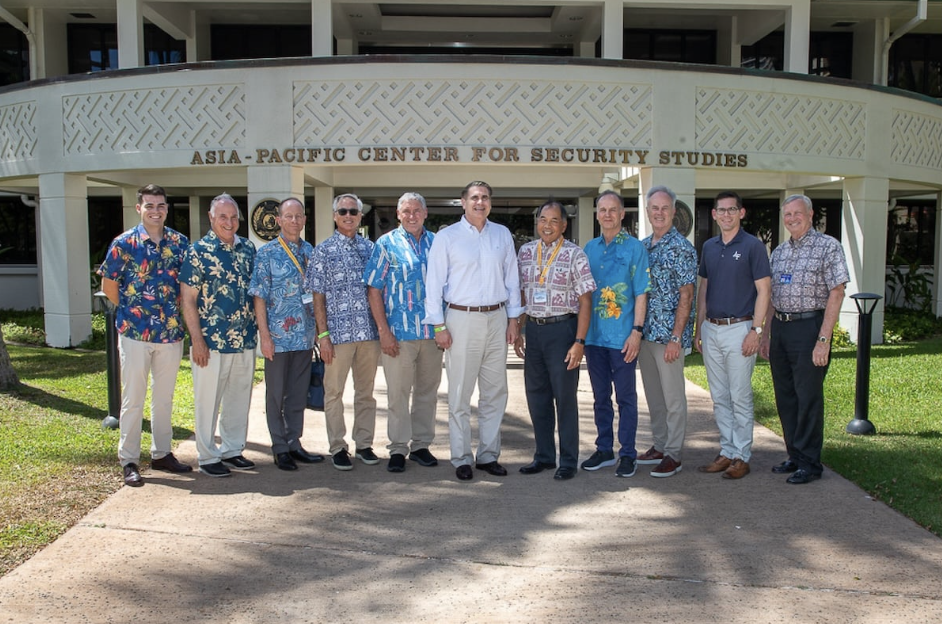
Late in August 2023, a contingent of IFC leaders and interested donors traveled to the U.S. Indo-Pacific Command theater to personally witness and talk about the rising threat level posed by the People’s Republic of China.
The group received briefings in Hawaii on activity around the South China Sea and what experts believe the People’s Republic of China’s next steps could be from the U.S. Indo-Pacific Command, Pacific Air Forces and Asia-Pacific Center for Security Studies.
The nine-person team — led by Gen. Shwedo; Maj. Gen. (Ret.) David Scott ’78, Air Force Academy Foundation liaison to the IFC; and Brig. Gen. (Ret.) David Stilwell ’87, Fox Fellow for Future Pacing Threats — then traveled to Taiwan to meet with key officials and get an up-close look at the complex situation.
“When we came back, we had that condensed version to share with the cadets,” Gen. Shwedo reports. “They get to learn about all sides of the conversation.”
Dr. Anthony Tingle, former IFC program director, was on the road extensively. He’s traveled to Ukraine several times to gather information about its war with Russia. Plus, he’s spoken to officials in Poland about NATO’s regional concerns.
“The insights from travel have been very helpful,” Gen. Shwedo says. “And it’s not just a one-way conversation. We are always sharing information back and forth when we travel.”
ON ICE
During her IFC tenure, Lt. Col. Kristen Heiserman, an Intermediate Developmental Education fellow, traveled to the Arctic to continue her research on that region.
“The work is important because currently the U.S. Northern Command commander’s No. 1 priority is domain awareness, especially in the Arctic, which is lacking,” she says. “We’re getting better with the establishment of over-the-horizon radars.”
During one trip, Col. Heiserman participated in survival school in Alaska, which provided her an up-close look at the challenges of operating in the Arctic region. She also traveled to Norway to participate in a wargame with Norwegian, Danish and Finnish military personnel.
“Because of that, I’m hoping to involve cadets and start collaborating with Norwegian Defence University College in a joint effort, including maybe with NATO,” she explains.
She has shared with cadets the intel she gathered from those experiences and others upon her return, including participation in a panel during a National Security Strategic Studies Partnership conference.
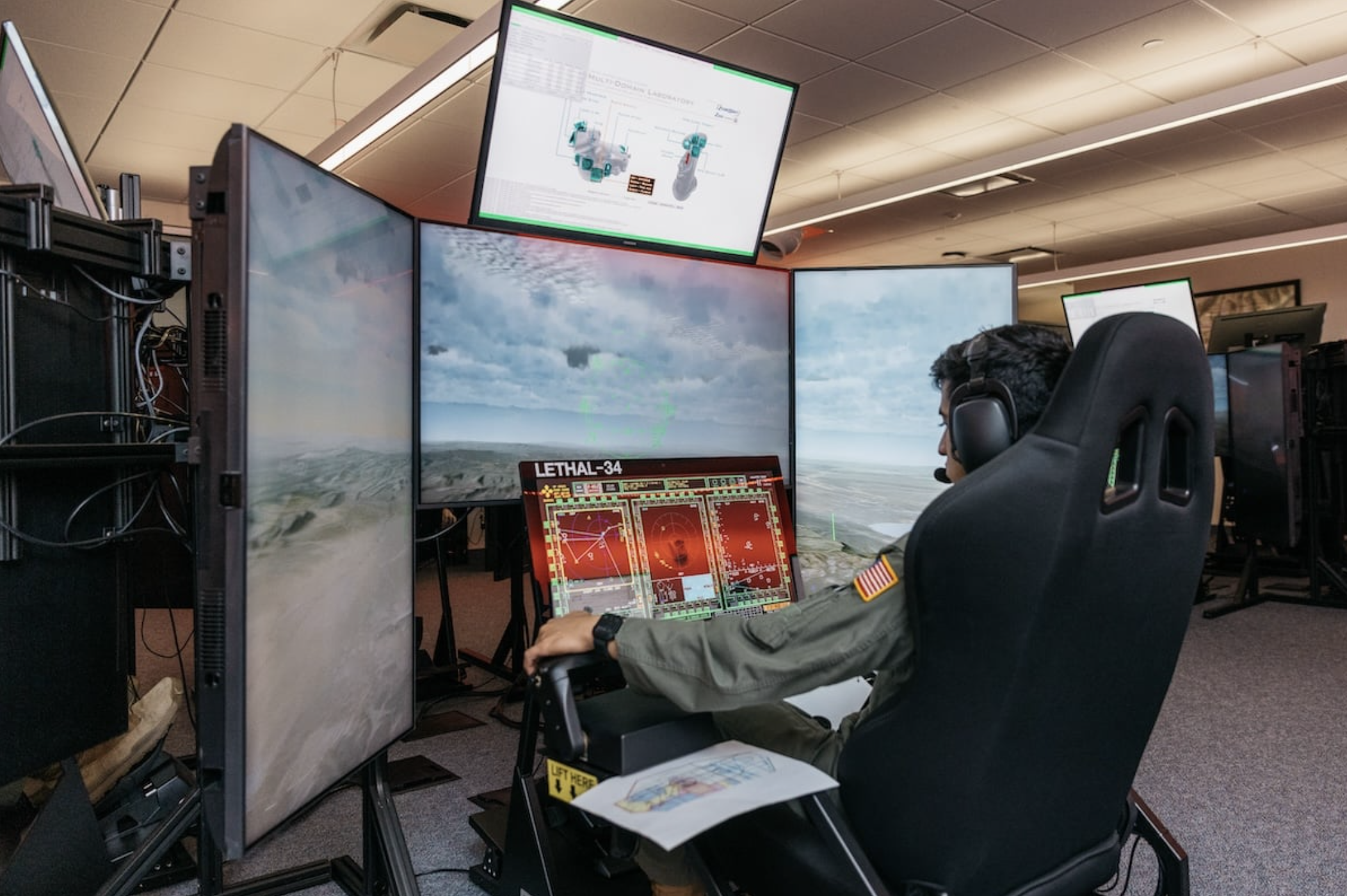
Connecting the Dots
Gen. Stilwell took several cadets to Rome last year to attend Asia Pacific Week at the NATO Defense College.
He says the experience gave the future Air Force and Space Force officers a glimpse at the developing threats throughout Asia and provided them some insight on how that theater’s warfighting is evolving.
Gen. Stilwell also took the group to Anzio, just south of Rome, for a history lesson relevant to the future fight. Anzio is where Gen. Stilwell’s father-in-law spent three months during World War II, waiting to attack the Germans.
“I showed them what fighting the last war looks like,” he says. “The U.S. took the beach unopposed, and then the one-star in charge demonstrated his fantastic World War I trenching techniques for a blitzkrieg war.”
According to Gen. Shwedo, future officers will need to be flexible thinkers to anticipate and counteract unexpected battlefield challenges.
“Cadets quickly find out how serious it can be if you get it wrong, and why you need to constantly analyze what that future conflict is going to be,” he says.
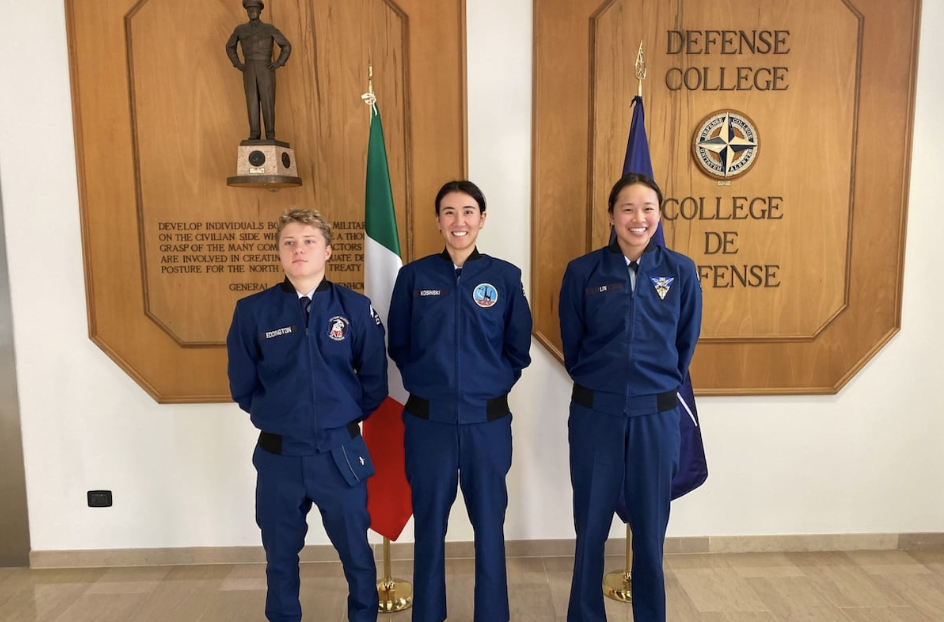
INFORMATION WARFARE/INFLUENCE OPERATIONS
As part of her efforts to ramp up a cadet information warfare club, Lt. Col. Melissa McLain ’09, Intermediate Developmental Education fellow, took cadets to 16th Air Force in San Antonio, Texas, three times to learn about the need for whole-of-government approaches to achieve effects in the information environment. In addition, they briefed the Cognitive Security Educational Strategy at the Senior Leader Summit this spring.
“Cadets spent a day with CGOs [company grade officers] primarily to learn about all the different career fields that contribute to information campaigns,” she reports. “It’s at the classified level. It’s hard to talk about what a cyber operator does, or an intel officer does, at an unclassified level. It’s really their first full immersion into what that career might look like.”
The trips helped answer questions for cadets considering a career in those fields, she says.
Most recently, the IFC paid for the cadets and Col. McLain to go on a cultural immersion trip to Latvia and Lithuania. The cadets spent one week over spring break learning about Russian narratives in western versus eastern Latvia.
Separate from the Information Warfare focus, Col. McLain worked on her combat collaborative aircraft capstone that cadets briefed at the Modeling and Simulations Summit in San Antonio in May. They presented the key takeaways from their demo-based discussions with current pilots.
POLICY EDUCATION
Dr. David Arceneaux, the Rossetti Fellow for Future Conflict, took a select group of cadets to Washington, D.C., to get a firsthand look at how the U.S. foreign policy process works.
They spent a full day at the Pentagon, meeting with Air Force and Joint Force personnel who work in the policy area. The IFC will again take cadets to the Pentagon this year to interact directly with senior defense leaders.
“They saw pretty much everybody that you could hope to see in that time,” Arceneaux says. The cadets also met with officials at the National Security Council, the U.S. State Department and think tanks based in the capital region. In addition, the group met with U.S. Rep. Doug Lamborn (Colorado’s 5th District) and his staff to discuss the process of U.S. foreign policymaking.
“When you take cadets out like that, they’re fascinated by the content,” Arceneaux says. “They want to learn, and it’s all very positively received.”
The IFC is also building its network of like-minded organizations with which to trade information and advance thinking on future conflict.
Since joining the IFC, Arceneaux has published research with the Bulletin of the Atomic Scientists, The National Interest, the Hague Center for Strategic Studies and leading academic outlets. He’s also participated in several track 1.5 dialogues in the United States and Europe, which bring policymakers, diplomats and academics together to discuss global challenges and develop strategies for addressing them.
DOD INFLUENCE
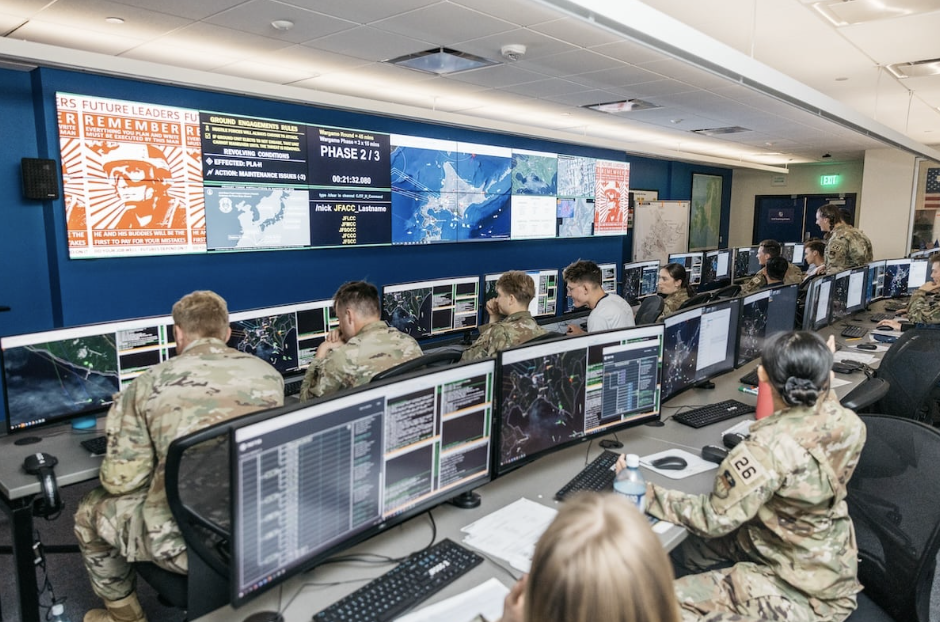
Dr. Greg Johnsen, the IFC associate director, says the mission of the institute is first and foremost to develop Air Force and Space Force leaders who can anticipate the future fight. Secondarily, the staff at the IFC seek to share their expertise with the broader Department of Defense.
“I think there’s a lot of ways that we can help and do our share,” Johnsen says. In addition, the IFC strives to educate the public about the changing face of warfighting and the multidomain approach necessary to counter great power competitors.
“It’s all part of having an informed electorate,” he says.
That’s the thinking behind the new Institute for Future Conflict website (launching soon), which will post policy commentary and analysis on warfighting trends from active and retired military officers, academics, civilian policymakers and USAFA graduates.
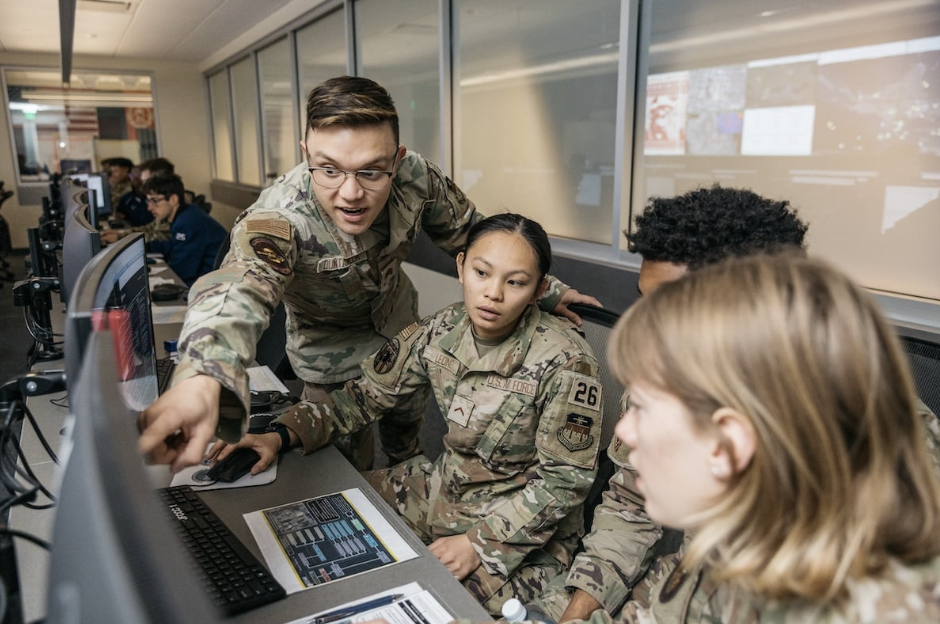
IMPORTANCE OF SPACE
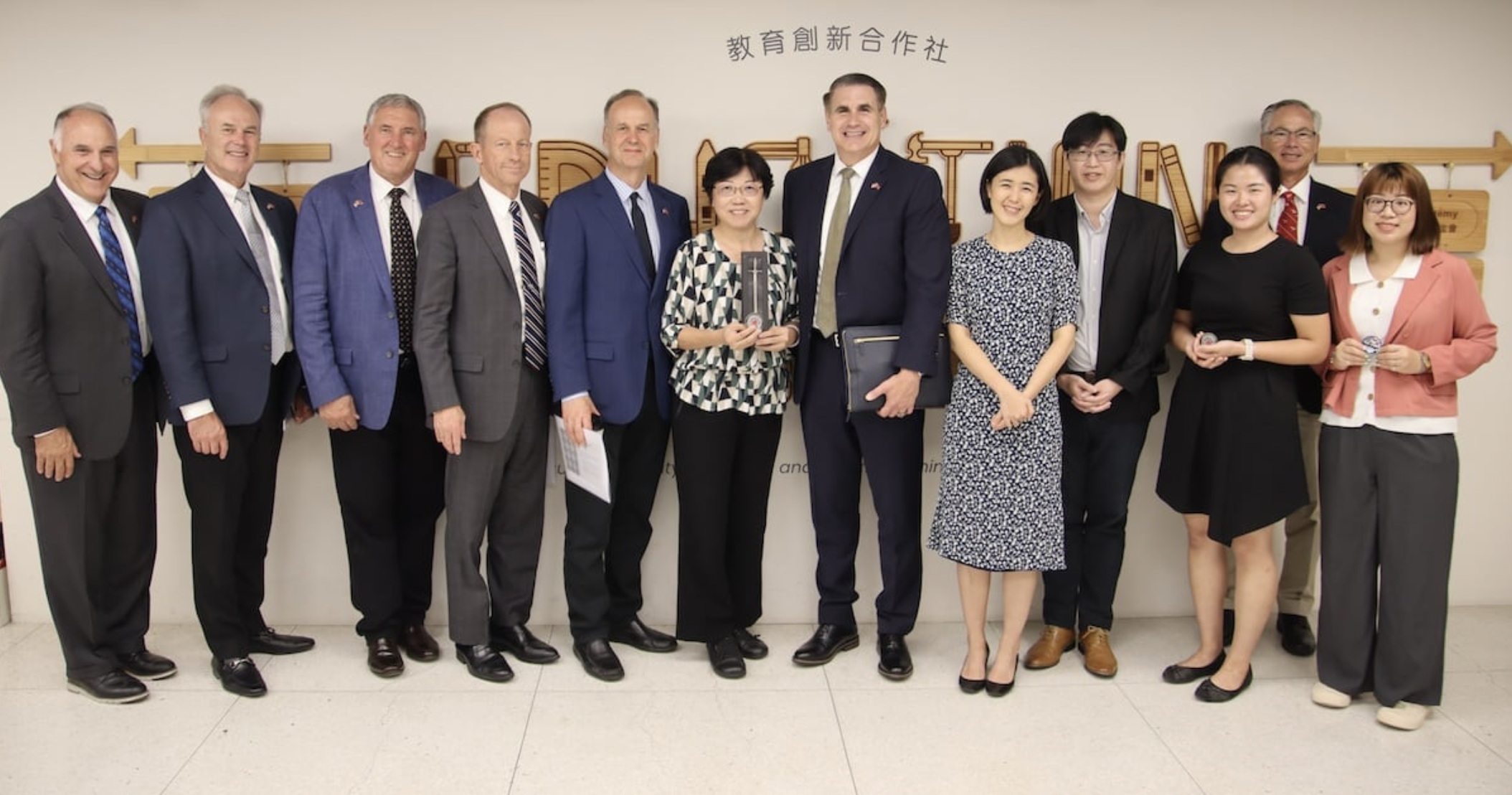
Maj. Gary Davenport, an Intermediate Developmental Education fellow, appreciated the opportunity to participate in National Security Strategic Studies Partnership panels focused on the importance of space in today’s and tomorrow’s fight.
As he talks with cadets and defense officials, Davenport draws upon recent examples of the impact space resources can have on battlefield success.
“We talk about the next big event that’s going to happen,” he says. “Space is going to be critical to any fight, whether it’s Taiwan, the fight in Ukraine, or the current fight that’s going on in Israel and Gaza.”
FREQUENT VISITORS
According to Gen. Scott, the IFC hosts frequent visitors asking questions about the institute’s efforts.
In November, two officials from George Mason University stopped by to learn more. During CORONA Week at USAFA in October, senior military leaders were briefed about the Academy and IFC partnership’s progress.
In addition, IFC senior leaders recently connected with Air University to ensure alignment between the USAFA curriculum and what’s taught at Officer Training School, Air Command and Staff College, and Air War College. They are connecting with the U.S. Military Academy and the U.S. Naval Academy, as well as with ROTC units, to find ways to collaborate on future conflict training and multidomain exercises. In addition, at the request of the Association of Graduates and multiple alumni organizations across the nation, the IFC is speaking about what it’s doing to create and cultivate flexible warfighters prepared to prevail in conflicts regardless of their future form.
Fellows and staff at the IFC are also asked frequently to speak at national conferences, on panels and in classes to provide future conflict updates to cadets, military personnel and others, according to Gen. Shwedo.
“We’re seeing more and more requests for our expertise, which is wonderful,” he says. “It puts us in forums that allow us to bring that information back to cadets at a much higher level.”
The IFC leadership is also mulling future fact-finding trips to key locales around the globe.
“We are continuing to propagate and solidify relationships,” according to Gen. Shwedo, “so we can continue to prepare our cadets for the future fight.”
